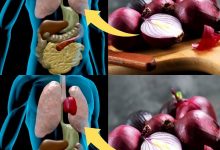By ALLIE HOGAN – Best life online
TRYING TO GET THESE FOOD ITEMS CLEAN COULD BE DOING MORE HARM THAN GOOD.
Washing a product thoroughly may always seem like the best thing to do to ensure it’s scrubbed clean of dirt and bacteria. However, experts warn that your intuition on cleanliness may not always be correct. There are some foods you might be inclined to wash before cooking that you should never clean, the Centers for Disease Control and Prevention (CDC) warns. In fact, trying to wash these foods could actually be doing more harm than good. Read on to find out which four foods you should never put under the faucet.
Never wash raw meat, chicken, turkey, or eggs.
After purchasing meat or poultry products from the store, you may feel inclined to rinse these items off to get rid of anything lingering from the farm or just the packaging they were kept in. However, the CDC advises against this. “Washing raw meat, chicken, turkey, or eggs can spread germs to your sink, countertops, and other surfaces in your kitchen,” the agency warns. “Those germs can get on other foods, like salads or fruit, and make you sick.”

Research shows that washing meat increases the chances of cross-contamination.
Recent research from the U.S. Department of Agriculture (USDA) found that washing meat or poultry increases the risk of cross-contamination in the kitchen, which can result in foodborne illness. The agency urges consumers to leave the risky habit behind immediately. “Avoid washing raw meat and poultry because potentially harmful bacteria on the surface of the raw product can accumulate in high concentrations within the sink and cross-contaminate ready-to-eat foods,” the USDA warns. The agency also points out that most bacteria are attached to these products quite loosely, so rinsing the items can shake the bacteria loose, allowing it to spread easily.

Washing eggs makes them more prone to bacteria.
You might understand why washing meat can lead to dangerous cross-contamination, but the risks are less obvious with eggs. Conor O’Flynn, operations manager of O’Flynn Medical, explains that washing an egg “may actively aid the transfer of harmful bacteria like salmonella from the outside of the egg to the inside of the egg.” When you wash an egg, the natural barriers the shell has can be compromised, “allowing the harmful bacteria to pass into the inside of the egg, giving it a perfect environment to grow.” The bacteria can then make its way to you if you don’t cook your eggs thoroughly enough, as you might with a runny fried egg.
The USDA says that when eggs are laid, they have a natural, protective coating called the bloom, which is the first line of defense against bacteria. The bloom is removed by the commercial washing process. “It is replaced by a light coating of edible mineral oil, which restores protection for long-term home storage of eggs,” the USDA explains. “Extra handling of the eggs in your home, such as washing them, could increase the risk of cross-contamination, especially if the shell becomes cracked.”

And washing meat and poultry is unnecessary in this day and age.
Although you may feel like you need to wash your meat and poultry, the USDA says it’s no longer necessary with current commercial washing techniques. While washing “to remove dirt, slime, fat or blood may have been appropriate decades ago when many slaughtered and prepared their own food, the modern food safety system doesn’t require it,” the USDA says. According to the agency, meat and poultry are cleaned thoroughly enough during processing. Therefore, any further washing is an unnecessary added risk.








